AI - Speech
Download as pptx, pdf0 likes17 views
Artificial intelligence (AI) aims to create machines that can perform tasks requiring human intelligence like reasoning, learning, perception and decision making. The history of AI began with ancient myths and philosophers exploring human thinking, with pioneers in the 1940s creating programmable computers. Current AI has achieved successes using new methods, powerful hardware and large datasets, though challenges remain. The future implications of AI include the potential emergence of general artificial intelligence, convergence with other technologies, and both opportunities for enhancing humanity as well as risks of human-AI conflict that require wisdom and responsibility to manage.
1 of 9
Download to read offline
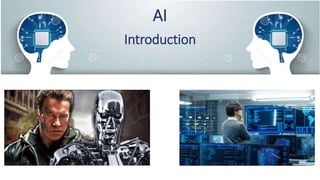
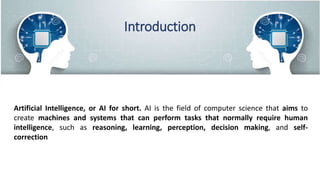
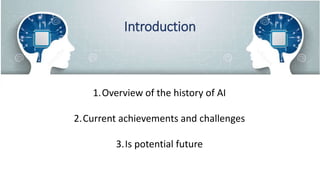
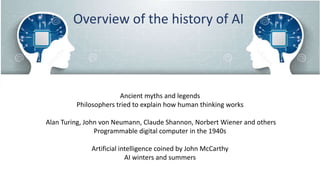

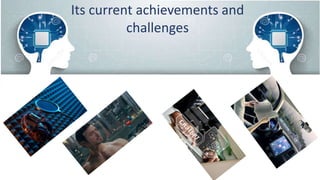
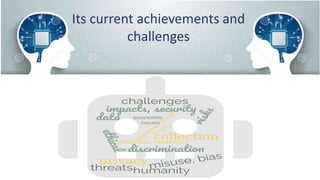

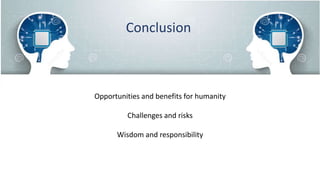
Ad
Recommended
Artificial intelligence
Artificial intelligence pramiidhaaavula
╠²
The document discusses the history, goals, current status, and future of artificial intelligence. It defines AI as making computers think intelligently like humans by studying the human brain. The goals of AI are to create expert systems that exhibit intelligent behavior and implement human intelligence in machines. The history of AI includes early foundations in the 1940s and milestones like Deep Blue beating Kasparov in 1997. Current AI is demonstrated in technologies like mobile assistants, robots, and self-driving cars. The future of AI is expected to include more human-level speech recognition and practical applications that digitally recreate human intelligence.What really is Artificial Intelligence about?
What really is Artificial Intelligence about? Harmony Kwawu
╠²
The document explores the concept of artificial intelligence (AI) by discussing its definitions, history, and implications. It highlights Stephen Hawking's warnings about AI potentially being a significant threat to humanity and outlines the benefits and challenges posed by AI technology. Furthermore, it provides a historical context, tracing the origins of AI to figures such as Alan Turing and John McCarthy, and emphasizes the multidisciplinary nature of the field.Introduction of Artificial Intelligence (AI)
Introduction of Artificial Intelligence (AI)haljordan29
╠²
Artificial intelligence (AI) simulates human intelligence in machines and has evolved since the 1950s, with key milestones marking its development. It includes narrow AI for specific tasks and general AI, which is still theoretical, and encompasses machine learning and deep learning techniques that enable computers to learn from data. AI applications span various fields, prompting ethical considerations around privacy and bias while holding the potential to revolutionize industries and improve daily life.Artificial intelligence- The science of intelligent programs
Artificial intelligence- The science of intelligent programsDerak Davis
╠²
Artificial intelligence (AI) involves creating intelligent computer programs and machines that can interact with the real world similarly to humans. AI uses techniques like machine learning, deep learning, and neural networks to allow programs to learn from data and experience without being explicitly programmed. While AI has potential benefits, some experts warn that advanced AI could pose risks if not developed carefully due to concerns it could become difficult for humans to control once a certain level of intelligence is achieved.Chapter 3- Artificial Intelligence (AI) with history of AI.pptx
Chapter 3- Artificial Intelligence (AI) with history of AI.pptxHailieeyesusKindie
╠²
The document provides a comprehensive overview of artificial intelligence (AI), defining it as man-made thinking power that imitates human thought processes to solve complex problems. It covers the history, advantages, disadvantages, goals, and different types of AI, while highlighting its applications across various fields such as healthcare, finance, and entertainment. Additionally, it discusses the evolution of AI technologies and their potential future developments, including the concepts of narrow AI, general AI, and superintelligence.presentation by faizan[1] [Read-Only].pptx
presentation by faizan[1] [Read-Only].pptxkhfaizan534
╠²
Artificial intelligence (AI) is the study of computer systems that attempt to mimic human intelligence. Early pioneers like Alan Turing asked if machines could think in the 1950s, and the field of AI was established in a 1956 workshop. Current AI includes intelligent digital assistants, self-driving cars, and medical applications. Challenges remain around computing power, intuitive thinking, and judgment. The future of AI may include improved transportation, healthcare, and exploration, though jobs could be lost and emotional intelligence remains limited.NSK ki PPT.pptx for programs project works
NSK ki PPT.pptx for programs project worksSujalSahu11
╠²
The document discusses artificial intelligence (AI), defining it as the simulation of human intelligence in machines. It covers the early history of AI, its current applications such as digital assistants, and future advancements like self-driving cars. The document also addresses the pros and cons of AI, highlighting its potential to enhance human capabilities while raising concerns about dependency and job displacement.NSK ki PPT.pptx report card for presentation
NSK ki PPT.pptx report card for presentationSujalSahu11
╠²
This document discusses artificial intelligence (AI), defining it as the simulation of intelligent behavior in machines, with a historical perspective starting from Alan Turing's 1950 paper. It covers the current status of AI across various applications, challenges it faces, and its potential future developments, such as self-driving cars and improved medical care. The document also outlines the pros and cons of AI, including its precision and lack of human-like qualities, concluding that AI is fundamentally the study of creating intelligent systems.Emerging Technology chapter 3.pptx
Emerging Technology chapter 3.pptxAderawAlemie
╠²
Based on Capabilities
B. Based on Functionality
1. Reactive Machines:
- Reactive machines are the simplest form of AI. They perceive their environment and
respond in a predetermined manner to achieve a specific goal.
- Examples include thermostats, industrial robots, and vacuum cleaners.
2. Limited Memory:
- These systems can remember past experiences and use that information to guide future
actions.
- Examples include chess playing programs and self-driving cars.
3. Theory of Mind:
- These systems can model other agents and take their beliefs, intentions, and desires into
account.
- Examples include personal assistants like Siri that understand context.
4. SelfThe Disadvantages Of Artificial Intelligence
The Disadvantages Of Artificial IntelligenceAngela Hays
╠²
Artificial intelligence is becoming increasingly important in technology and transforming societies. While AI brings benefits like improved efficiency and productivity, it also poses risks like job disruption and increased inequality. Overall, whether AI improves or worsens societies will depend on how its development and application are guided.Artificialintelligence
ArtificialintelligenceRavi Rao
╠²
The document outlines the concept of artificial intelligence (AI), its history, definitions, and motivations for its development, including the comparison between human and computer intelligence. It discusses the limitations and various technologies used in AI, as well as its advantages and applications across fields like gaming, healthcare, and expert systems. The potential for AI to improve human capabilities and solve complex tasks is emphasized, alongside the challenges that remain before achieving true intelligent machines.Introduction Artificial Intelligence (AI)
Introduction Artificial Intelligence (AI)vkgtharet
╠²
The document introduces artificial intelligence (AI), discussing concepts like the physical symbol system hypothesis, Turing machines, and key definitions of AI. It outlines various models and properties of AI, including the differences between narrow AI, general AI, and strong AI, as well as the foundations related to machine learning and neural networks. The lecture also emphasizes the interplay between human cognitive processes and computer architectures in the pursuit of developing intelligent machines.Introduction to AI.pptx
Introduction to AI.pptxKhushalKakakhel
╠²
This document provides an overview of the history and current state of artificial intelligence. It discusses key events like the Dartmouth workshop in 1956 which is seen as the official birth of AI. The document also explores different applications of AI like in movies, news, and real world tasks. It discusses challenges for the future like ensuring AI is beneficial to humanity and aligned with human values and preferences.Darshana'AI .pptx
Darshana'AI .pptxAvinashChaudhary74
╠²
The document provides an overview of artificial intelligence (AI) including definitions of AI and machine learning. It discusses the history of AI from its origins in the 1940s and 50s to modern applications. The major branches of AI are described as well as common uses in areas like robotics, data mining, medical diagnosis, and video games. Both the advantages of AI such as efficiency and lack of errors as well as the disadvantages including cost and potential to decrease human labor are outlined. The document concludes by discussing the future of AI and some of the ethical issues that arise.Introduction to Artificial intelligence and ML
Introduction to Artificial intelligence and MLbansalpra7
╠²
The document discusses the definition and history of artificial intelligence (AI), highlighting its origins, key figures, and evolving challenges in various domains. It defines AI as the science of making machines capable of performing tasks typically requiring human intelligence and examines the complexity of mechanizing certain cognitive tasks. The history of AI is traced from its early theories and developments to current trends in machine learning and intelligent systems.Introduction-to-Artificial-Intelligence.pptx
Introduction-to-Artificial-Intelligence.pptxnandhuanbu2023
╠²
The document provides an overview of artificial intelligence (AI), covering its history, types, applications across various industries, and ethical considerations. It discusses the evolution from early concepts to modern machine learning and the anticipated future of AI, emphasizing the importance of responsible development. Challenges such as data quality, algorithm bias, and job displacement are highlighted, alongside the potential for AI to transform sectors like healthcare and finance.Introduction to Artificial Intelligences
Introduction to Artificial IntelligencesMeenakshi Paul
╠²
Here are the steps I would take to diagnose electrical problems with a car:
1. Check the spark plugs. Look for fouling, cracking, or gaps that are too wide or narrow. Replace as needed.
2. Check the ignition timing. Use a timing light to ensure it is properly set. Adjust if necessary.
3. Test the battery with a voltmeter. It should read over 12 volts. If lower, have the battery and charging system checked.
4. Inspect wires and connectors for cracks, corrosion or loose connections. Tighten or replace as needed.
5. Check for faulty sensors that could cause ignition or fuel delivery problems, like the crankshaft position sensorcomputer science engineering spe ialized in artificial Intelligence
computer science engineering spe ialized in artificial IntelligenceKhanKhaja1
╠²
Dr. C. Lee Giles is a professor at Penn State University who teaches a course on artificial intelligence and information sciences. The document provides an overview of artificial intelligence including definitions, theories, impact on information science, and topics covered in the course such as machine learning, information retrieval, text processing, and social networks. It also discusses the scientific method applied to developing theories in information sciences and contrasts weak and strong definitions of artificial intelligence.ai.ppt
ai.pptAlfonsoDAdams1
╠²
Here are the steps I would take to diagnose electrical problems with a car:
1. Check the spark plugs. Look for fouling, cracking, or gaps that are too wide or narrow. Replace as needed.
2. Check the ignition timing. Use a timing light to ensure it is properly set. Adjust if necessary.
3. Test the battery with a voltmeter. It should read over 12 volts. If lower, have the battery and charging system inspected.
4. Inspect wires and connectors for cracks, corrosion or loose connections. Tighten or replace as needed.
5. Check for faulty sensors that could cause ignition or fuel delivery issues, like the crankshaft position sensorai.ppt
ai.pptsecurework
╠²
Here are the steps I would take to diagnose electrical problems with a car:
1. Check the spark plugs. Look for fouling, cracking, or gaps that are too wide or narrow. Replace as needed.
2. Check the ignition timing. Use a timing light to ensure it is properly set. Adjust if necessary.
3. Test the battery with a voltmeter. It should read over 12 volts. If lower, have the battery and charging system inspected.
4. Inspect wires and connectors for cracks, corrosion or loose connections. Tighten or replace as needed.
5. Check for faulty sensors that could cause ignition or fuel delivery issues, like the crankshaft position sensorai.ppt
ai.pptKhanKhaja1
╠²
Here are the steps I would take to diagnose electrical problems with a car:
1. Check the spark plugs. Look for fouling, cracking, or gaps that are too wide or narrow. Replace as needed.
2. Check the ignition timing. Use a timing light to ensure it is properly set. Adjust if necessary.
3. Test the battery with a voltmeter. It should read over 12 volts. If lower, have the battery and charging system inspected.
4. Inspect wires and connectors for cracks, corrosion or loose connections. Tighten or replace as needed.
5. Check for faulty sensors that could cause ignition or fuel delivery issues, like the crankshaft position sensorai.ppt
ai.ppt20I302AMOHAMMEDASWIR
╠²
Dr. C. Lee Giles is a professor at Penn State University who teaches a course on artificial intelligence and information sciences. The document provides an overview of artificial intelligence including definitions, theories, impact on information science, and topics covered in the course such as machine learning, information retrieval, text processing, and social networks. It also discusses the scientific method applied to developing theories in information sciences and contrasts weak and strong definitions of artificial intelligence.ARTIFICIAL INTELLIGENCE (A.I).pdf how it works
ARTIFICIAL INTELLIGENCE (A.I).pdf how it worksrd4678039
╠²
This document provides an overview of artificial intelligence (AI), including its definition, history, current applications, challenges, and future. It begins with defining AI as the study of computer systems that attempt to mimic human intelligence. The early history section then discusses the origins of AI research from the 1950s onwards, including the first AI program called the "Logic Theorist". Current applications of AI discussed include automated customer support, personalized shopping, and financial forecasts. Challenges for AI include computing power, tolerance, intuitive and judging power. The future sections predicts that AI will speed up life through faster decision making but also raise issues around privacy, regulation, and human-AI collaboration.History of Artificial Intelligence.pptx
History of Artificial Intelligence.pptxayushsharma230705
╠²
The document outlines the history and evolution of artificial intelligence (AI), detailing key milestones from its inception in the 1950s to contemporary advancements in machine learning and deep learning. It discusses the application of AI across various industries, including healthcare, finance, and automation, as well as ethical considerations and future directions in research. The overall impact of AI on society is significant, presenting both opportunities and challenges.Artificial Intelligent is more powerful than human because Ai can easity adap...
Artificial Intelligent is more powerful than human because Ai can easity adap...canoysamanthafaith29
╠²
Artificial intelligence (AI) simulates human intelligence processes like learning and reasoning, with significant milestones dating back to 1950. AI is widely applied in sectors such as healthcare, finance, and autonomous vehicles, offering benefits like increased efficiency and accuracy, while facing challenges like bias and privacy concerns. Understanding AI is essential as it increasingly integrates into daily life and impacts various industries.New Seminar 1674884334777445774322235.pdf
New Seminar 1674884334777445774322235.pdfAlokPradhan59
╠²
Artificial intelligence (AI) is defined as computer systems that attempt to model human intelligence. The document discusses the early history of AI from Alan Turing's 1950 paper asking if machines can think to John McCarthy coining the term "artificial intelligence" in 1956. Current applications of AI include digital assistants like Siri, advances in machine learning and deep learning, and uses in areas like self-driving cars, medical diagnosis, and space exploration. Challenges for AI include computing power, intuitive thinking, and judging ability. The future of AI is promising but also presents risks if not developed responsibly.AI Unit1.ppt
AI Unit1.pptKhanKhaja1
╠²
This document provides an introduction to artificial intelligence, including definitions, foundations, history, and techniques. It defines AI as attempting to understand and build intelligent devices by replicating tasks like perception, reasoning, and knowledge representation. The key foundations are acting humanly through tests like the Turing Test versus acting rationally by building intelligent agents. The history outlines early work in the 1940s-50s and origins of the field in 1956, followed by growth of expert systems, neural networks, and current techniques like autonomous planning, game playing, diagnosis, and robotics.AI Unit1b.ppt
AI Unit1b.pptKhanKhaja1
╠²
This document provides an introduction to artificial intelligence, including definitions, foundations, history, and techniques. It defines AI as attempting to understand and build intelligent devices by covering activities like perception, reasoning, and knowledge representation. The key foundations of AI are discussed, such as acting humanly through the Turing test versus acting rationally. The origins and development of AI from the 1940s to today are outlined, highlighting influential researchers and milestones. Advanced techniques discussed include game playing, autonomous control, diagnosis, planning, and language understanding.cnc-processing-centers-centateq-p-110-en.pdf
cnc-processing-centers-centateq-p-110-en.pdfAmirStern2
╠²
Î×οÎøÎû ÎóÎÖÎæÎòÎôÎÖÎØ Î¬ÎóήÎÖÎÖάÎÖ ÎæÎóΣ 3/4/5 ΪÎÖοÎÖÎØ, ÎóÎô 22 ÎöÎùΣÎñÎòά ÎøΣÎÖÎØ ÎóÎØ ÎøΣ ÎÉÎñήοÎòÎÖÎòά ÎöÎóÎÖÎæÎòÎô ÎöÎôοÎòήÎòά.╠²ÎæÎóΣ ήÎÿÎù ÎóÎæÎòÎôÎö ÎÆÎôÎòΣ ÎòÎ×ÎùήÎæ ÎáÎòÎù ÎòκΣ ΣÎöÎñÎóΣÎö ÎæήÎñÎö ÎöÎóÎæοÎÖά/οÎòÎíÎÖά/ÎÉÎáÎÆΣÎÖά/ÎíÎñοÎôÎÖά/ÎóοÎæÎÖά ÎòÎóÎòÎô..
Î×ÎíÎòÎÆΣ ΣÎæΪÎó ÎñÎóÎòΣÎòά ÎóÎÖÎæÎòÎô ήÎòÎáÎòά ÎöÎ×άÎÉÎÖÎ×Îòά ΣÎóÎáÎñÎÖÎØ Î®ÎòÎáÎÖÎØ: κÎÖÎôÎòÎù ÎÉÎáÎøÎÖ, ÎÉÎòÎñκÎÖ, ÎáÎÖÎíÎòο, ÎòÎøοÎíÎòÎØ ÎÉÎáÎøÎÖ.More Related Content
Similar to AI - Speech (20)
Emerging Technology chapter 3.pptx
Emerging Technology chapter 3.pptxAderawAlemie
╠²
Based on Capabilities
B. Based on Functionality
1. Reactive Machines:
- Reactive machines are the simplest form of AI. They perceive their environment and
respond in a predetermined manner to achieve a specific goal.
- Examples include thermostats, industrial robots, and vacuum cleaners.
2. Limited Memory:
- These systems can remember past experiences and use that information to guide future
actions.
- Examples include chess playing programs and self-driving cars.
3. Theory of Mind:
- These systems can model other agents and take their beliefs, intentions, and desires into
account.
- Examples include personal assistants like Siri that understand context.
4. SelfThe Disadvantages Of Artificial Intelligence
The Disadvantages Of Artificial IntelligenceAngela Hays
╠²
Artificial intelligence is becoming increasingly important in technology and transforming societies. While AI brings benefits like improved efficiency and productivity, it also poses risks like job disruption and increased inequality. Overall, whether AI improves or worsens societies will depend on how its development and application are guided.Artificialintelligence
ArtificialintelligenceRavi Rao
╠²
The document outlines the concept of artificial intelligence (AI), its history, definitions, and motivations for its development, including the comparison between human and computer intelligence. It discusses the limitations and various technologies used in AI, as well as its advantages and applications across fields like gaming, healthcare, and expert systems. The potential for AI to improve human capabilities and solve complex tasks is emphasized, alongside the challenges that remain before achieving true intelligent machines.Introduction Artificial Intelligence (AI)
Introduction Artificial Intelligence (AI)vkgtharet
╠²
The document introduces artificial intelligence (AI), discussing concepts like the physical symbol system hypothesis, Turing machines, and key definitions of AI. It outlines various models and properties of AI, including the differences between narrow AI, general AI, and strong AI, as well as the foundations related to machine learning and neural networks. The lecture also emphasizes the interplay between human cognitive processes and computer architectures in the pursuit of developing intelligent machines.Introduction to AI.pptx
Introduction to AI.pptxKhushalKakakhel
╠²
This document provides an overview of the history and current state of artificial intelligence. It discusses key events like the Dartmouth workshop in 1956 which is seen as the official birth of AI. The document also explores different applications of AI like in movies, news, and real world tasks. It discusses challenges for the future like ensuring AI is beneficial to humanity and aligned with human values and preferences.Darshana'AI .pptx
Darshana'AI .pptxAvinashChaudhary74
╠²
The document provides an overview of artificial intelligence (AI) including definitions of AI and machine learning. It discusses the history of AI from its origins in the 1940s and 50s to modern applications. The major branches of AI are described as well as common uses in areas like robotics, data mining, medical diagnosis, and video games. Both the advantages of AI such as efficiency and lack of errors as well as the disadvantages including cost and potential to decrease human labor are outlined. The document concludes by discussing the future of AI and some of the ethical issues that arise.Introduction to Artificial intelligence and ML
Introduction to Artificial intelligence and MLbansalpra7
╠²
The document discusses the definition and history of artificial intelligence (AI), highlighting its origins, key figures, and evolving challenges in various domains. It defines AI as the science of making machines capable of performing tasks typically requiring human intelligence and examines the complexity of mechanizing certain cognitive tasks. The history of AI is traced from its early theories and developments to current trends in machine learning and intelligent systems.Introduction-to-Artificial-Intelligence.pptx
Introduction-to-Artificial-Intelligence.pptxnandhuanbu2023
╠²
The document provides an overview of artificial intelligence (AI), covering its history, types, applications across various industries, and ethical considerations. It discusses the evolution from early concepts to modern machine learning and the anticipated future of AI, emphasizing the importance of responsible development. Challenges such as data quality, algorithm bias, and job displacement are highlighted, alongside the potential for AI to transform sectors like healthcare and finance.Introduction to Artificial Intelligences
Introduction to Artificial IntelligencesMeenakshi Paul
╠²
Here are the steps I would take to diagnose electrical problems with a car:
1. Check the spark plugs. Look for fouling, cracking, or gaps that are too wide or narrow. Replace as needed.
2. Check the ignition timing. Use a timing light to ensure it is properly set. Adjust if necessary.
3. Test the battery with a voltmeter. It should read over 12 volts. If lower, have the battery and charging system checked.
4. Inspect wires and connectors for cracks, corrosion or loose connections. Tighten or replace as needed.
5. Check for faulty sensors that could cause ignition or fuel delivery problems, like the crankshaft position sensorcomputer science engineering spe ialized in artificial Intelligence
computer science engineering spe ialized in artificial IntelligenceKhanKhaja1
╠²
Dr. C. Lee Giles is a professor at Penn State University who teaches a course on artificial intelligence and information sciences. The document provides an overview of artificial intelligence including definitions, theories, impact on information science, and topics covered in the course such as machine learning, information retrieval, text processing, and social networks. It also discusses the scientific method applied to developing theories in information sciences and contrasts weak and strong definitions of artificial intelligence.ai.ppt
ai.pptAlfonsoDAdams1
╠²
Here are the steps I would take to diagnose electrical problems with a car:
1. Check the spark plugs. Look for fouling, cracking, or gaps that are too wide or narrow. Replace as needed.
2. Check the ignition timing. Use a timing light to ensure it is properly set. Adjust if necessary.
3. Test the battery with a voltmeter. It should read over 12 volts. If lower, have the battery and charging system inspected.
4. Inspect wires and connectors for cracks, corrosion or loose connections. Tighten or replace as needed.
5. Check for faulty sensors that could cause ignition or fuel delivery issues, like the crankshaft position sensorai.ppt
ai.pptsecurework
╠²
Here are the steps I would take to diagnose electrical problems with a car:
1. Check the spark plugs. Look for fouling, cracking, or gaps that are too wide or narrow. Replace as needed.
2. Check the ignition timing. Use a timing light to ensure it is properly set. Adjust if necessary.
3. Test the battery with a voltmeter. It should read over 12 volts. If lower, have the battery and charging system inspected.
4. Inspect wires and connectors for cracks, corrosion or loose connections. Tighten or replace as needed.
5. Check for faulty sensors that could cause ignition or fuel delivery issues, like the crankshaft position sensorai.ppt
ai.pptKhanKhaja1
╠²
Here are the steps I would take to diagnose electrical problems with a car:
1. Check the spark plugs. Look for fouling, cracking, or gaps that are too wide or narrow. Replace as needed.
2. Check the ignition timing. Use a timing light to ensure it is properly set. Adjust if necessary.
3. Test the battery with a voltmeter. It should read over 12 volts. If lower, have the battery and charging system inspected.
4. Inspect wires and connectors for cracks, corrosion or loose connections. Tighten or replace as needed.
5. Check for faulty sensors that could cause ignition or fuel delivery issues, like the crankshaft position sensorai.ppt
ai.ppt20I302AMOHAMMEDASWIR
╠²
Dr. C. Lee Giles is a professor at Penn State University who teaches a course on artificial intelligence and information sciences. The document provides an overview of artificial intelligence including definitions, theories, impact on information science, and topics covered in the course such as machine learning, information retrieval, text processing, and social networks. It also discusses the scientific method applied to developing theories in information sciences and contrasts weak and strong definitions of artificial intelligence.ARTIFICIAL INTELLIGENCE (A.I).pdf how it works
ARTIFICIAL INTELLIGENCE (A.I).pdf how it worksrd4678039
╠²
This document provides an overview of artificial intelligence (AI), including its definition, history, current applications, challenges, and future. It begins with defining AI as the study of computer systems that attempt to mimic human intelligence. The early history section then discusses the origins of AI research from the 1950s onwards, including the first AI program called the "Logic Theorist". Current applications of AI discussed include automated customer support, personalized shopping, and financial forecasts. Challenges for AI include computing power, tolerance, intuitive and judging power. The future sections predicts that AI will speed up life through faster decision making but also raise issues around privacy, regulation, and human-AI collaboration.History of Artificial Intelligence.pptx
History of Artificial Intelligence.pptxayushsharma230705
╠²
The document outlines the history and evolution of artificial intelligence (AI), detailing key milestones from its inception in the 1950s to contemporary advancements in machine learning and deep learning. It discusses the application of AI across various industries, including healthcare, finance, and automation, as well as ethical considerations and future directions in research. The overall impact of AI on society is significant, presenting both opportunities and challenges.Artificial Intelligent is more powerful than human because Ai can easity adap...
Artificial Intelligent is more powerful than human because Ai can easity adap...canoysamanthafaith29
╠²
Artificial intelligence (AI) simulates human intelligence processes like learning and reasoning, with significant milestones dating back to 1950. AI is widely applied in sectors such as healthcare, finance, and autonomous vehicles, offering benefits like increased efficiency and accuracy, while facing challenges like bias and privacy concerns. Understanding AI is essential as it increasingly integrates into daily life and impacts various industries.New Seminar 1674884334777445774322235.pdf
New Seminar 1674884334777445774322235.pdfAlokPradhan59
╠²
Artificial intelligence (AI) is defined as computer systems that attempt to model human intelligence. The document discusses the early history of AI from Alan Turing's 1950 paper asking if machines can think to John McCarthy coining the term "artificial intelligence" in 1956. Current applications of AI include digital assistants like Siri, advances in machine learning and deep learning, and uses in areas like self-driving cars, medical diagnosis, and space exploration. Challenges for AI include computing power, intuitive thinking, and judging ability. The future of AI is promising but also presents risks if not developed responsibly.AI Unit1.ppt
AI Unit1.pptKhanKhaja1
╠²
This document provides an introduction to artificial intelligence, including definitions, foundations, history, and techniques. It defines AI as attempting to understand and build intelligent devices by replicating tasks like perception, reasoning, and knowledge representation. The key foundations are acting humanly through tests like the Turing Test versus acting rationally by building intelligent agents. The history outlines early work in the 1940s-50s and origins of the field in 1956, followed by growth of expert systems, neural networks, and current techniques like autonomous planning, game playing, diagnosis, and robotics.AI Unit1b.ppt
AI Unit1b.pptKhanKhaja1
╠²
This document provides an introduction to artificial intelligence, including definitions, foundations, history, and techniques. It defines AI as attempting to understand and build intelligent devices by covering activities like perception, reasoning, and knowledge representation. The key foundations of AI are discussed, such as acting humanly through the Turing test versus acting rationally. The origins and development of AI from the 1940s to today are outlined, highlighting influential researchers and milestones. Advanced techniques discussed include game playing, autonomous control, diagnosis, planning, and language understanding.Artificial Intelligent is more powerful than human because Ai can easity adap...
Artificial Intelligent is more powerful than human because Ai can easity adap...canoysamanthafaith29
╠²
Recently uploaded (20)
cnc-processing-centers-centateq-p-110-en.pdf
cnc-processing-centers-centateq-p-110-en.pdfAmirStern2
╠²
Î×οÎøÎû ÎóÎÖÎæÎòÎôÎÖÎØ Î¬ÎóήÎÖÎÖάÎÖ ÎæÎóΣ 3/4/5 ΪÎÖοÎÖÎØ, ÎóÎô 22 ÎöÎùΣÎñÎòά ÎøΣÎÖÎØ ÎóÎØ ÎøΣ ÎÉÎñήοÎòÎÖÎòά ÎöÎóÎÖÎæÎòÎô ÎöÎôοÎòήÎòά.╠²ÎæÎóΣ ήÎÿÎù ÎóÎæÎòÎôÎö ÎÆÎôÎòΣ ÎòÎ×ÎùήÎæ ÎáÎòÎù ÎòκΣ ΣÎöÎñÎóΣÎö ÎæήÎñÎö ÎöÎóÎæοÎÖά/οÎòÎíÎÖά/ÎÉÎáÎÆΣÎÖά/ÎíÎñοÎôÎÖά/ÎóοÎæÎÖά ÎòÎóÎòÎô..
Î×ÎíÎòÎÆΣ ΣÎæΪÎó ÎñÎóÎòΣÎòά ÎóÎÖÎæÎòÎô ήÎòÎáÎòά ÎöÎ×άÎÉÎÖÎ×Îòά ΣÎóÎáÎñÎÖÎØ Î®ÎòÎáÎÖÎØ: κÎÖÎôÎòÎù ÎÉÎáÎøÎÖ, ÎÉÎòÎñκÎÖ, ÎáÎÖÎíÎòο, ÎòÎøοÎíÎòÎØ ÎÉÎáÎøÎÖ.OpenPOWER Foundation & Open-Source Core Innovations
OpenPOWER Foundation & Open-Source Core InnovationsIBM
╠²
penPOWER offers a fully open, royalty-free CPU architecture for custom chip design.
It enables both lightweight FPGA cores (like Microwatt) and high-performance processors (like POWER10).
Developers have full access to source code, specs, and tools for end-to-end chip creation.
It supports AI, HPC, cloud, and embedded workloads with proven performance.
Backed by a global community, it fosters innovation, education, and collaboration.The Future of Technology: 2025-2125 by Saikat Basu.pdf
The Future of Technology: 2025-2125 by Saikat Basu.pdfSaikat Basu
╠²
A peek into the next 100 years of technology. From Generative AI to Global AI networks to Martian Colonisation to Interstellar exploration to Industrial Nanotechnology to Artificial Consciousness, this is a journey you don't want to miss. Which ones excite you the most? Which ones are you apprehensive about? Feel free to comment! Let the conversation begin!WebdriverIO & JavaScript: The Perfect Duo for Web Automation
WebdriverIO & JavaScript: The Perfect Duo for Web Automationdigitaljignect
╠²
In todayÔÇÖs dynamic digital landscape, ensuring the quality and dependability of web applications is essential. While Selenium has been a longstanding solution for automating browser tasks, the integration of WebdriverIO (WDIO) with Selenium and JavaScript marks a significant advancement in automation testing. WDIO enhances the testing process by offering a robust interface that improves test creation, execution, and management. This amalgamation capitalizes on the strengths of both tools, leveraging SeleniumÔÇÖs broad browser support and WDIOÔÇÖs modern, efficient approach to test automation. As automation testing becomes increasingly vital for faster development cycles and superior software releases, WDIO emerges as a versatile framework, particularly potent when paired with JavaScript, making it a preferred choice for contemporary testing teams.Quantum AI Discoveries: Fractal Patterns Consciousness and Cyclical Universes
Quantum AI Discoveries: Fractal Patterns Consciousness and Cyclical UniversesSaikat Basu
╠²
Embark on a cosmic journey exploring the intersection of quantum
computing, consciousness, and ancient wisdom. Together we'll uncover the
recursive patterns that bind our reality.You are not excused! How to avoid security blind spots on the way to production
You are not excused! How to avoid security blind spots on the way to productionMichele Leroux Bustamante
╠²
We live in an ever evolving landscape for cyber threats creating security risk for your production systems. Mitigating these risks requires participation throughout all stages from development through production delivery - and by every role including architects, developers QA and DevOps engineers, product owners and leadership. No one is excused! This session will cover examples of common mistakes or missed opportunities that can lead to vulnerabilities in production - and ways to do better throughout the development lifecycle.OpenACC and Open Hackathons Monthly Highlights June 2025
OpenACC and Open Hackathons Monthly Highlights June 2025OpenACC
╠²
The OpenACC organization focuses on enhancing parallel computing skills and advancing interoperability in scientific applications through hackathons and training. The upcoming 2025 Open Accelerated Computing Summit (OACS) aims to explore the convergence of AI and HPC in scientific computing and foster knowledge sharing. This year's OACS welcomes talk submissions from a variety of topics, from Using Standard Language Parallelism to Computer Vision Applications. The document also highlights several open hackathons, a call to apply for NVIDIA Academic Grant Program and resources for optimizing scientific applications using OpenACC directives.OWASP Barcelona 2025 Threat Model Library
OWASP Barcelona 2025 Threat Model LibraryPetraVukmirovic
╠²
Threat Model Library Launch at OWASP Barcelona 2025
https://owasp.org/www-project-threat-model-library/EIS-Webinar-Engineering-Retail-Infrastructure-06-16-2025.pdf
EIS-Webinar-Engineering-Retail-Infrastructure-06-16-2025.pdfEarley Information Science
╠²
As AI reshapes expectations in retail and B2B commerce, organizations are recognizing a critical reality: meaningful AI outcomes depend on well-structured, adaptable infrastructure. In this session, Seth Earley is joined by Phil Ryan - AI strategist, search technologist, and founder of Glass Leopard Technologies - for a candid conversation on what it truly means to engineer systems for scale, agility, and intelligence.
Phil draws on more than two decades of experience leading search and AI initiatives for enterprise organizations. Together, he and Seth explore the challenges businesses face when legacy architectures limit personalization, agility, and real-time decisioning - and what needs to change to support agentic technologies and next-best-action capabilities.
Key themes from the webinar include:
Composability as a prerequisite for AI╠²- Why modular, loosely coupled systems are essential for adapting to rapid innovation and evolving business needs
Search and relevance as foundational to AI╠²- How techniques honed-in enterprise search have laid the groundwork for more responsive and intelligent customer experiences
From MDM and CDP to agentic systems╠²- How data platforms are evolving to support richer customer context and dynamic orchestration
Engineering for business alignment╠²- Why successful AI programs require architectural decisions grounded in measurable outcomes
The conversation is practical and forward-looking, connecting deep technical understanding with real-world business needs. Whether youÔÇÖre modernizing your commerce stack or exploring how AI can enhance product discovery, personalization, or customer journeys, this session provides a clear-eyed view of the capabilities, constraints, and priorities that matter most.AI Agents and FME: A How-to Guide on Generating Synthetic Metadata
AI Agents and FME: A How-to Guide on Generating Synthetic MetadataSafe Software
╠²
In the world of AI agents, semantics is king. Good metadata is thus essential in an organization's AI readiness checklist. But how do we keep up with the massive influx of new data? In this talk we go over the tips and tricks in generating synthetic metadata for the consumption of human users and AI agents alike.UserCon Belgium: Honey, VMware increased my bill
UserCon Belgium: Honey, VMware increased my billstijn40
╠²
VMwareÔÇÖs pricing changes have forced organizations to rethink their datacenter cost management strategies. While FinOps is commonly associated with cloud environments, the FinOps Foundation has recently expanded its framework to include ScopesÔÇöand Datacenter is now officially part of the equation. In this session, weÔÇÖll map the FinOps Framework to a VMware-based datacenter, focusing on cost visibility, optimization, and automation. YouÔÇÖll learn how to track costs more effectively, rightsize workloads, optimize licensing, and drive efficiencyÔÇöall without migrating to the cloud. WeÔÇÖll also explore how to align IT teams, finance, and leadership around cost-aware decision-making for on-prem environments. If your VMware bill keeps increasing and you need a new approach to cost management, this session is for you!Salesforce Summer '25 Release Frenchgathering.pptx.pdf
Salesforce Summer '25 Release Frenchgathering.pptx.pdfyosra Saidani
╠²
Salesforce Summer '25 Release Frenchgathering.pptx.pdfMastering AI Workflows with FME by Mark Döring
Mastering AI Workflows with FME by Mark DöringSafe Software
╠²
Harness the full potential of AI with FME: From creating high-quality training data to optimizing models and utilizing results, FME supports every step of your AI workflow. Seamlessly integrate a wide range of models, including those for data enhancement, forecasting, image and object recognition, and large language models. Customize AI models to meet your exact needs with FMEÔÇÖs powerful tools for training, optimization, and seamless integrationRaman Bhaumik - Passionate Tech Enthusiast
Raman Bhaumik - Passionate Tech EnthusiastRaman Bhaumik
╠²
A Junior Software Developer with a flair for innovation, Raman Bhaumik excels in delivering scalable web solutions. With three years of experience and a solid foundation in Java, Python, JavaScript, and SQL, she has streamlined task tracking by 20% and improved application stability.Smarter Aviation Data Management: Lessons from Swedavia Airports and Sweco
Smarter Aviation Data Management: Lessons from Swedavia Airports and SwecoSafe Software
╠²
Managing airport and airspace data is no small task, especially when youÔÇÖre expected to deliver it in AIXM format without spending a fortune on specialized tools. But what if there was a smarter, more affordable way?
Join us for a behind-the-scenes look at how Sweco partnered with Swedavia, the Swedish airport operator, to solve this challenge using FME and Esri.
Learn how they built automated workflows to manage periodic updates, merge airspace data, and support data extracts ÔÇô all while meeting strict government reporting requirements to the Civil Aviation Administration of Sweden.
Even better? Swedavia built custom services and applications that use the FME Flow REST API to trigger jobs and retrieve results ÔÇô streamlining tasks like securing the quality of new surveyor data, creating permdelta and baseline representations in the AIS schema, and generating AIXM extracts from their AIS data.
To conclude, FME expert Dean Hintz will walk through a GeoBorders reading workflow and highlight recent enhancements to FMEÔÇÖs AIXM (Aeronautical Information Exchange Model) processing and interpretation capabilities.
Discover how airports like Swedavia are harnessing the power of FME to simplify aviation data management, and how you can too.9-1-1 Addressing: End-to-End Automation Using FME
9-1-1 Addressing: End-to-End Automation Using FMESafe Software
╠²
This session will cover a common use case for local and state/provincial governments who create and/or maintain their 9-1-1 addressing data, particularly address points and road centerlines. In this session, you'll learn how FME has helped Shelby County 9-1-1 (TN) automate the 9-1-1 addressing process; including automatically assigning attributes from disparate sources, on-the-fly QAQC of said data, and reporting. The FME logic that this presentation will cover includes: Table joins using attributes and geometry, Looping in custom transformers, Working with lists and Change detection." How to survive with 1 billion vectors and not sell a kidney: our low-cost c...
" How to survive with 1 billion vectors and not sell a kidney: our low-cost c...Fwdays
╠²
Let's talk about our history. How we started the project with a small vector database of less than 2 million records. Later, we received a request for +100 million records, then another +100... And so gradually we reached almost 1 billion. Standard tools were quickly running out of steam - we were running into performance, index size, and very limited resources. After a long series of trials and errors, we built our own low-cost cluster, which today stably processes thousands of queries to more than 1B vectors.Enhance GitHub Copilot using MCP - Enterprise version.pdf
Enhance GitHub Copilot using MCP - Enterprise version.pdfNilesh Gule
╠²
║¦║¦▀ú deck related to the GitHub Copilot Bootcamp in Melbourne on 17 June 2025A Constitutional Quagmire - Ethical Minefields of AI, Cyber, and Privacy.pdf
A Constitutional Quagmire - Ethical Minefields of AI, Cyber, and Privacy.pdfPriyanka Aash
╠²
A Constitutional Quagmire - Ethical Minefields of AI, Cyber, and PrivacyYou are not excused! How to avoid security blind spots on the way to production
You are not excused! How to avoid security blind spots on the way to productionMichele Leroux Bustamante
╠²
Ad
AI - Speech
- 2. Introduction Artificial Intelligence, or AI for short. AI is the field of computer science that aims to create machines and systems that can perform tasks that normally require human intelligence, such as reasoning, learning, perception, decision making, and self- correction
- 3. Introduction 1.Overview of the history of AI 2.Current achievements and challenges 3.Is potential future
- 4. Overview of the history of AI Ancient myths and legends Philosophers tried to explain how human thinking works Alan Turing, John von Neumann, Claude Shannon, Norbert Wiener and others Programmable digital computer in the 1940s Artificial intelligence coined by John McCarthy AI winters and summers
- 5. Its current achievements and challenges New methods, powerful hardware and massive data sets
- 6. Its current achievements and challenges
- 7. Its current achievements and challenges
- 8. Is potential future implications for society and humanity Emergence of artificial general intelligence Convergence of AI with other technologies Enhancement of human intelligence with AI implants Coexistence or conflict of human and artificial intelligence
- 9. Conclusion Opportunities and benefits for humanity Challenges and risks Wisdom and responsibility
